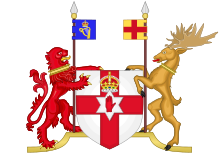Senate of Northern Ireland
| Senate of Northern Ireland | |
|---|---|
| Devolved Parliament | |

Arms of Northern Ireland, 1924–1972
|
|
| Type | |
| Type | |
| History | |
| Established | 7 June 1921 |
| Disbanded | 30 March 1972 |
| Leadership | |
|
Lord Glentoran (last)
|
|
|
Sir Jack Andrews (last)
|
|
| Elections | |
| Elected by the Commons via STV | |
| Meeting place | |
 |
|
| Senate Chamber Parliament Buildings, Stormont, Belfast |
|
The Senate of Northern Ireland was the upper house of the Parliament of Northern Ireland created by the Government of Ireland Act 1920. It was abolished with the passing of the Northern Ireland Constitution Act 1973.
In practice the Senate of Northern Ireland possessed little power and even less influence. While intended as a revising chamber, in practice, debates and votes typically simply replicated those in the Commons. As early as 1926, five years after its creation, calls began for its abolition.
From 1932, when the building was completed, until 1972, the Senate of Northern Ireland met in the Senate Chamber of Parliament Buildings in Stormont on the eastern outskirts of Belfast. To make parallels with the British House of Lords, members of the Senate sat on red benches.
The Senate consisted of 26 members. Twenty-four members elected by the House of Commons of Northern Ireland using the Single Transferable Vote (STV), elected in blocks of twelve with each senator's term lasting for two parliaments (i.e. two terms of the House of Commons) and two ex-officio members: the Lord Mayor of Belfast and Mayor of Londonderry. Convention held that, in the event of a by-election, only members of the Commons from the same county would vote on their replacement. The election system was maintained even after the abolition of STV for the House of Commons.
In 1925, at the end of the first parliament, the senators to retire were selected by lot. At the subsequent election, voting papers from the Nationalist MPs and George Henderson were deemed to have been submitted late, and were not considered. All these members had given a high preference to the Nationalist candidate, Vincent Devoto, and a subsequent analysis of the transfers showed that these would otherwise have been sufficient to elect him.
...
Wikipedia
